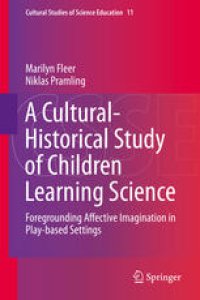
Ebook: A Cultural-Historical Study of Children Learning Science: Foregrounding Affective Imagination in Play-based Settings
- Tags: Science Education, Childhood Education, Learning & Instruction
- Series: Cultural Studies of Science Education 11
- Year: 2015
- Publisher: Springer Netherlands
- Edition: 1
- Language: English
- pdf
This book moves beyond the traditional constructivist and social-constructivist view of learning and development in science. It draws upon cultural-historical theory in order to theorise early childhood science education in relation to our currently globalised education contexts. The book argues that concept development in science for young children can be better theorised by using Vygotsky’s concept of Imagination and creativity, Vygotsky’s theory of play, and his work on higher mental functions, particularly the concept of inter and intrapsychological functioning. Key concepts are extracted from the theoretical section of the book and used as categories for analysis in presenting evidence and new ideas in the second section of the book. In this second part of the book, the authors examine how science knowledge has been constructed within particular countries around the globe, where empirical research in early childhood science education has occurred. The third part of the book examines the nature of the encounter between the teacher and the child during science learning and teaching. In the final part of the book the authors look closely at the range of models and approaches to the teaching of early childhood science that have been made available to early childhood teachers to guide their planning and teaching. They conclude the book with a theoretical discussion of the cultural-historical foundation for early childhood science education, followed by a model of teaching scientific concepts to young children in play-based settings, including homes and community contexts.
This book provides an account of children’s science learning beyond the traditional constructivist and social-constructivist view. It conceptualises science as a body of knowledge that humans have constructed (historically) and reconstructed (contemporary) to meet human needs. As such, this human invention acts as an evolving cultural tool for supporting and helping to understand everyday life. Drawing upon cultural-historical theory, the book theorises early childhood science education in relation to current globalised education contexts. Its aim is to advance the understanding of the many ways that science concepts are learned by very young children.
The book presents a theoretical discussion of the cultural-historical foundation for early childhood science education. It examines contemporary theories of learning and development within the general field of early childhood education. This theoretical examination allows for the foundational pedagogical context of young learners to be interrogated. This kind of analysis makes it possible to examine play-based contexts in relation to opportunities for scientific conceptual development of young children. From a cultural-historical point of view, and taking into account relevant empirical literature, the book introduces and promotes a more relevant approach to the teaching of science and for the development of young children’s scientific thinking. The book ends with presenting a pedagogical model for introducing scientific concepts to young children in play-based settings.